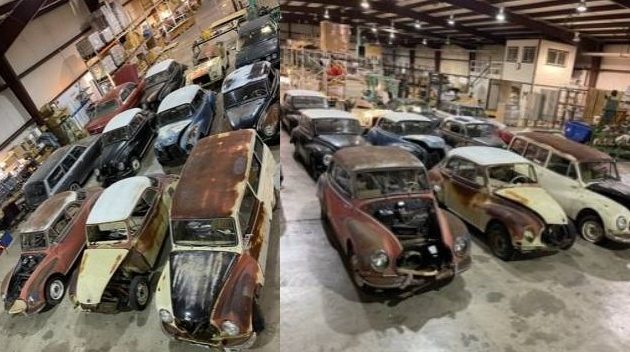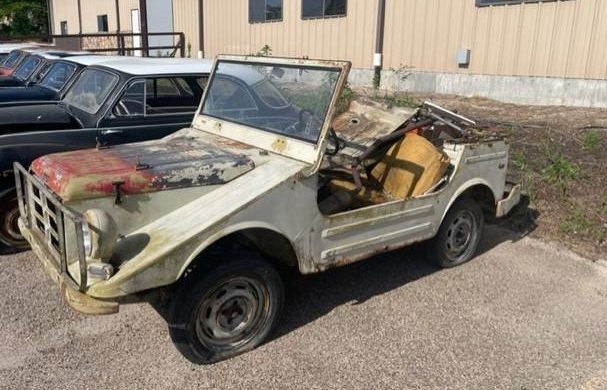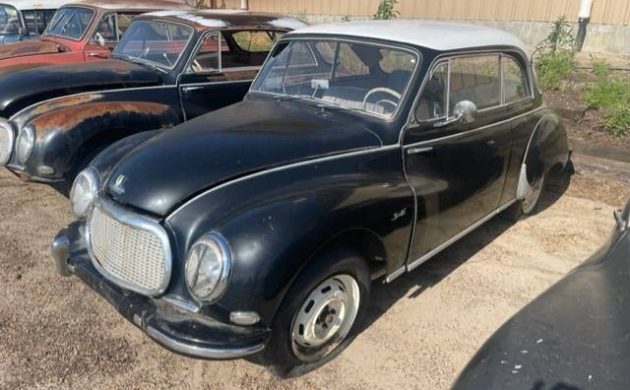DKW, a German car and motorcycle manufacturing company that dates to 1916, was one of four companies that merged to form Auto Union in 1932, which is an ancestor to today’s Audi. They built a variety of cars, trucks, and utility vehicles through 1964. The seller has amassed eight of these little transports, including the Munga (akin to a Jeep). He’s lost his storage space in Winnsboro, Texas and the group must go. The asking price here on craigslist is $6,500, but it’s unclear whether that’s for the whole collection or just the Munga. This interesting tip comes to us via Barn Finder T.J.
At the heart of DKW products was their use of two-stroke engines. They were developed for use in toys but later expanded for application in over-the-road use. As part of Auto Union, the company came under Daimler-Benz ownership in 1957 and subsequently Volkswagen in 1964. The DKW brand disappeared shortly thereafter. The DKW trademark is owned by Audi AG which also owns the rights to other historical trademarks and intellectual property of the Auto Union combination.
Perhaps the most unusual vehicle in this bunch is the 1960 Munga 1000. They were built between 1956 and 1968 and saw more than 46,000 copies, so they weren’t rare on their home turf but are much more so in the U.S. Of the other seven DKWs the seller owns, they appear to be sedans except for one station wagon. Out of the eight in total, only about half of them have engine blocks, but the seller says he has heads, carburetors, and transmission for all of them. Six have titles and two do not.
If you were looking to acquire at least one of these interesting cars, you’re not likely to find this many in one place. We don’t know of their overall completeness, but you could assume there’s enough there to make up more than one good car. Parts for these automobiles are likely going to be hard to come by in the U.S., so you’d have your own built-in supply chain right at your fingertips.









It is not a German Jeep .
I’ll bet the 2stroketurbo guy on YouTube will be keen to acquire this collection.
Seems like you get a lot for the price. Probably enough parts to restore at least 3 of them.
I had a 1958 DKW Munga like the one shown here, it was sold new to a guy in Pennsylvania who was an avid outdoorsman and wanted it for it’s small size, 4 wheel drive, and cheap price.
It was a very low mileage vehicle in great condition, however if it sat for more than a couple of weeks, the only way we could get it to start was to pull it behind another vehicle & let the clutch out while in 2nd gear.
The original owner said the Munga was damn near impossible to get stuck, and I found his claim was fairly accurate. It was a full time 4 wheel drive, very high center of gravity, and all wheel independent suspension, however this meant it was a difficult vehicle to control at speeds above about 35 MPH. The Munga was originally intended as a Jeep-type German military vehicle, and they didn’t need a faster vehicle. But using it on American roads, I was always afraid that in even with the slightest quick action turn of the steering wheel, the Munga would flip onto it’s side.
I was stationed in Germany in the mid 1970s, and worked with the German military from time to time. I remember German army guys telling me why neither West German or East German troops could ever make a sneak attack . . .
It seems the West German army used the 2-stroke Munga in large numbers, and the East German Army used a military version of the 2-stroke Trabant. The guys claimed that just starting all those thousands of 2-stroke engines would let the other side know they were going to attack, due to the huge blue cloud overhead!
Que?
No habla espanol. Anybody out there that can translate?
It’s not Spanish, it’s Portuguese. He basically discusses the history of the Munga in south America, they made them under license in Brazil, but due to the drive train with the 4 wheel drive system having to come from Germany, the import tariffs made the Munga too expensive, so they stopped making them in 1963.
Thanks Bill unfortunately I cannot speak Spanish or Portuguese and appreciate the translation interesting how many cool vehicles have been available in South America and no in US dam regulations
These are not far from me. If anyone is interested, I’d be happy to go get some more pictures. I went and looked them over and spoke with the seller, a very nice man. The Munga does not have the engine or transaxle currently installed, although I believe I saw them on a pallet inside the sellers warehouse. The seller said the $6500 asking price was for all the DKWs. The lot included the Munga, several 3=6 Sonderklasse sedans, a wagon and one later model pillarless sedan. The seller also has a few other cars for sale not shown in this listing.